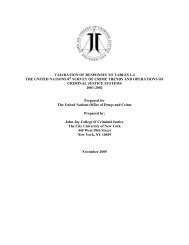Manual for Training Police on Anti Human Trafficking
Manual for Training Police on Anti Human Trafficking
Manual for Training Police on Anti Human Trafficking
You also want an ePaper? Increase the reach of your titles
YUMPU automatically turns print PDFs into web optimized ePapers that Google loves.
Facilitating Skills<br />
It is significant to assess the Learning Needs of your prospective participants to actually know what is<br />
it that you need to address and communicate through your training. The following has been designed<br />
both as an exercise that you can do with participants who are trainer/facilitators themselves and/or use<br />
the in<str<strong>on</strong>g>for</str<strong>on</strong>g>mati<strong>on</strong> to build you own skills.<br />
Important issues in assessing learning skills<br />
Motivati<strong>on</strong><br />
Brainstorm - Why might people come to your training course <strong>on</strong> AHT (think of the training task<br />
course initially). Any other factors that motivate people? Note down the resp<strong>on</strong>ses.<br />
Divide suggested motivati<strong>on</strong>s into:<br />
1. EXTERNAL factors (payment, per diem, friends going, told to attend etc.)<br />
2. INTERNAL factors (desire to learn)<br />
Brainstorm <strong>on</strong> how trainer/facilitator might boost participants’ motivati<strong>on</strong> to learn? What might<br />
cause their motivati<strong>on</strong> to decrease? Some likely c<strong>on</strong>clusi<strong>on</strong>s:<br />
1. Motivati<strong>on</strong> based <strong>on</strong> external factors doesn’t last l<strong>on</strong>g – people are there in body but not in<br />
mind.<br />
2. Motivati<strong>on</strong> must come from within. The learner must WANT to partake in the learning – the<br />
facilitator can help them want to by identifying and meeting their needs and by providing<br />
a positive learning experience.<br />
Why should we assess the learning needs of participants? You may want to link this to the secti<strong>on</strong><br />
<strong>on</strong> motivati<strong>on</strong> and characteristics of adult learners:<br />
- Adults have pre-existing skills, knowledge and experience, to which they will be relating<br />
the training.<br />
- Expertise does not necessarily all lie with the trainer/facilitator.<br />
- Motivati<strong>on</strong> partly depends <strong>on</strong> trainer/facilitators meeting the learner’ needs and fulfilling<br />
their expectati<strong>on</strong>s.<br />
- As course trainer/facilitator, have you/how have you assessed learning needs in the past?<br />
- As course participants, how have their learning needs been assessed?<br />
List different methods e.g. pre-course questi<strong>on</strong>naire; teleph<strong>on</strong>e/email survey; initial sessi<strong>on</strong> of<br />
the training course and use the most appropriate <strong>on</strong>e <str<strong>on</strong>g>for</str<strong>on</strong>g> your training.<br />
Also of importance is the issue of how much flexibility can be built into the course:<br />
How much are you willing to tailor your course to the learning needs of particular groups?<br />
How much opportunity is there to incorporate participants experience in the course (e.g. in group<br />
exercises, discussi<strong>on</strong>s, presentati<strong>on</strong>s etc)?<br />
Following is a suggestive pre-course questi<strong>on</strong>naire that you may want to use to assess learning needs of<br />
your participants:<br />
Samples of learning needs analysis 47<br />
Pre-course Survey: <str<strong>on</strong>g>Training</str<strong>on</strong>g> of Trainer/facilitators <strong>on</strong> AHT<br />
1. Name: Stati<strong>on</strong>:<br />
2. Designati<strong>on</strong><br />
3. Have you ever attended any training or courses <strong>on</strong> AHT. If so, which <strong>on</strong>e?<br />
4. Have you attended any courses <strong>on</strong> training skills <str<strong>on</strong>g>for</str<strong>on</strong>g> AHT. Which <strong>on</strong>e(s)?<br />
5. Have you run training or workshops <strong>on</strong> AHT or <strong>on</strong> other issues (If so, which issues?)<br />
6. Are you planning to run training/workshops <strong>on</strong> AHT? (If so, when? For whom?)<br />
7. What do you hope to get out of this training <strong>on</strong> AHT?<br />
75

















